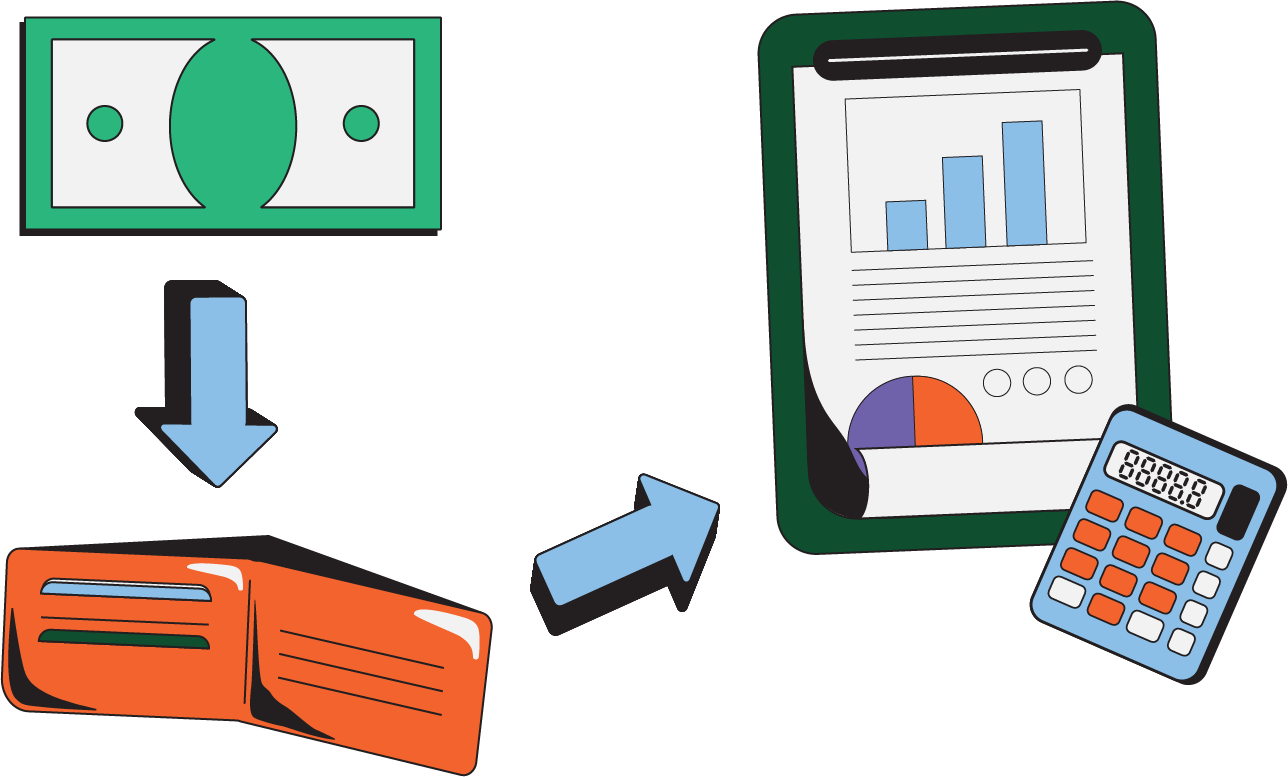What Is Outsourced Accounting and Will It Benefit Your Business?
Are your books driving you crazy? Outsourced accounting can help you stay on top of your accounts and save time and money. Here’s how it works.
Unsure about the difference between cash vs accrual accounting? Find out which method suits you best and how it can impact your small business.

As a small business owner, using the correct accounting method can be the difference in making informed financial decisions, improving cash management, and optimizing your tax bill. In this article, we will discuss the advantages and disadvantages of both accrual basis accounting and cash basis accounting and which one of these two accounting methods may be best suited for your small business.
To simplify the topic, we'll use an imaginary business as an example.
Tom's Lawn Care (TLC) is a small business based in a suburban area. They specialize in mowing and maintaining lawns for residential and commercial customers. For simplicity we will assume that TLC only has one expense and one source of revenue.
Throughout this article, we will use Tom's Lawn Care company as an example to illustrate various accounting methods, concepts and principles. We'll take a closer look at the difference cash and accrual accounting can make for Tom's business.

In accounting, revenue refers to the income earned by a business from its operations, typically from the sale of goods or services to its customers. Simply, it's the money you receive from goods or services you sell or provide.
Tom's Lawn Care company earns revenue from providing lawn care services to its customers. The revenue is generated from the fees charged for services such as mowing, trimming, fertilizing, and landscaping. Since Tom's Lawn Care company charges $100 to mow a customer's lawn, that $100 would be considered revenue for the business.
A business expense is any cost incurred by a business in order to generate revenue. This means that an expense is something your business pays in hopes of generating revenue as a direct or indirect result of the expense.
Tom's Lawn Care business has one employee, Rick, who is responsible for mowing and maintaining lawns for their customers. Since Tom pays Rick $25 per hour and each lawn takes approximately 2 hours to complete this would mean Tom pays the employee wages of $50 per lawn. The wages paid to this employees would be considered an expense as the owner has hired Rick to mow lawns in order to generate revenue.
Unearned revenue is a business transaction where a customer pays in advance for a service that the business has not yet provided. As such, even though a business has the cash in the bank, it still owes the customer the work. Under double entry bookkeeping, this business transaction would still need to be captured as such there is a name for it so we can record it in the books. Double entry bookkeeping is a system of recording financial transactions that involves entering each transaction into two accounts, one as a debit and the other as a credit.
For example, a TLC customer prepaid $4,800 for a 12-month lawn care service contract. The $4,800 is considered unearned revenue and is treated as a liability in accounting because the company hasn't started providing the service yet.
Because TLC provides the service over a 12-month period, it can recognize the revenue as earned and reduce the unearned revenue liability by $400 per month ($4,800 divided by 12 months). By the end of the 12 months, all of the unearned revenue will have been recognized as revenue, and the liability will be reduced to zero.
Now let's bring this all together. The matching principle is a fundamental concept in accounting that requires that expenses for financial transactions should be recorded in the same period as the revenue they generate.
Let's say Tom's Lawn Care company provides one weekly lawn maintenance service for a customer's property, with an agreed-upon fee of $100 per week in December. The matching principle says that the business would recognize the $400 in revenue and also recognize the expenses incurred to provide the service, such as Rick's wages of $50 per week. These expenses would be matched to the revenue earned in the same period, as they accrued expenses that were incurred to generate that revenue.
Let's start with the simpler method: Cash Basis Accounting. Sometimes called the Cash method of accounting, cash basis method, or even just cash accounting. This accounting method records revenue and expenses when cash is received or paid.
Let's say TLC uses cash basis accounting. If a customer received $400 in lawn care services but has not paid for the services, then no money has reached TLC's business bank account. So the business' bank accounts would not recognize the $400 as revenue until it is actually received in cash.
So if the customer mentioned before doesn't pay for his December services until January 1st Tom's Lawn Care company would then recognize the $400 as revenue for the month of January, when the cash was received, not December, when the work was done.

1) Cash Basis Accounting is generally simpler to use and understand than accrual accounting, which makes it ideal for small businesses with limited accounting knowledge and resources.
2) Cash Basis Accounting also allows businesses to track cash flow in real-time since it only records transactions when money changes hands, providing an accurate picture of the business's current financial situation.
3) Business owners gain a clear picture of the business's cash position, making it easier for business owners to manage their cash flow and make informed financial decisions.
4) Many tax advantages are available for small businesses with cash basis accounting, particularly if they experience a lot of bad debts or have inventory that is difficult to value.
1) Cash Basis accounting does not reflect the timing of revenue and expenses accurately, which can result in inaccurate financial reporting.
2) Since cash basis accounting will only record revenue or expenses when they hit the bank account, cash basis accounting provides limited insight into a company's financial health. Cash accounting makes it difficult to identify trends or anticipate future cash flows. Since it doesn't account for all incoming revenue or outgoing expenses, only the ones that hit the bank.
3) Cash Basis accounting may result in higher tax liability because income and expenses are recognized in the year they are received or paid, regardless of when they were earned or incurred.
4) Not ideal for larger businesses often have more complex financial transactions, and larger gross receipts so it would not provide a complete picture of a company's financial activity.
The Cash Accounting method can also have big implications on a business's tax bill. For tax purposes, the Cash basis Accounting method can lower your taxes because you don't have to pay taxes on income that you haven't yet received, and you can deduct expenses in the year that you pay them.
In the case of TLC's prepaid customer, TLC receives payment from a customer in advance for a 12-month service contract in December of the current year. Under cash basis accounting, the business would have to recognize the revenue and pay income taxes on it in the current year, even though the services won't be provided until the following year and technically TLC hasn't earned the revenue yet. This would result in TLC paying taxes on revenue in the current year that it hasn't earned yet.
Cash basis accounting can also cause your taxes to be lower in some cases. With TLC's Late Customer, TLC provided the service to the customer in December but didn't receive payment until January of the following year. Under cash basis accounting, the business would recognize the revenue and pay taxes on it in January when the payment is received. This delay in recognizing the revenue could potentially lower the business's taxes in the current year because it's not paying taxes on the revenue until the following year.
Accrual Basis accounting is based on the matching principle. Sometimes called the accrual method of accounting, accrual basis accounting or even just accrual based accounting. Accrual accounting recognizes revenue and expenses when they are earned or incurred, regardless of when the money is received or paid. This is the method of accounting accepted under the generally accepted accounting principles(GAAP) issued by the Financial Accounting standards board.

Going back to Tom's Lawn Care company, let's say the customer has fallen behind on their payments and owes the company $400 from the four weeks of services provided in December. Since the company provided lawn maintenance services to the customer in the four weeks of December, even if the customer pays the money owed on his bill January 1st, the company would still recognize the $400 in revenue for those weeks in December even if that cash hasn't hit the bank balance yet.
Likewise, under the matching principle the company would recognize the expenses associated with providing those services, such as the cost the cost the company pays for labor, equipment, and materials, in the same period that the sales revenue is earned. For Tom's Lawn Care Company he would recognize the $50 the company pays weekly ($200 total) to his employee Rick to do the lawn maintenance in December.
By matching the revenue with the associated expenses in the same period, the company can provide a more accurate representation of its profitability and financial performance, even if some customers fall behind on their payments. Under the accrual accounting method, even though Tom's Lawn Care hasn't received immediate payment for the services, he can clearly see on his financial statement that the expense paid in wages to Rick generated $400 of Revenue and can see that his profit is $200.
Many businesses choose accrual basis accounting as it can show a clear picture of the business's financial health by capturing all of the company's transactions regardless of whether they've reached the bank.
1) Accrual basis provides a more accurate picture of a company's financial health by matching revenues with related expenses.
2) It can help small businesses better manage cash flow by allowing them to anticipate future income and expenses.
3) Small business owners can make more informed decisions by providing a clearer understanding of their financial position.
4) It is required by generally accepted accounting principles (GAAP) for most businesses, ensuring compliance and consistency in financial reporting.
1) Requires more time and resources to maintain accurate records and prepare financial statements.
2) May not reflect a business's actual cash flow, which could be a problem if the business has trouble collecting payments from customers or paying bills on time.
Accrual accounting can affect tax liability by allowing for prepayment of expenses or deferral of income, which may result in lower taxable income and tax liability in the current year, but higher taxable income and tax liability in future years when the prepayments are recognized or income is received.
For example, if Tom's Lawn Care company provided the $400 in lawn care services in December, under accrual accounting principles, the $400 would be recognized as revenue for that year, even if the customer has not yet paid. If the customer pays on January 1st, Tom will have to pay taxes on the $400 for the previous tax year even though the client hasn't paid yet.
Alternatively, if TLC received an advance payment of $4,800 from the customer for a 12-month lawn care service contract, that represents unearned revenue. This is recorded as a liability on the company's balance sheet. In this case, it isn't taxable until it's earned.

So what should you choose when it comes to cash and accrual accounting?
The one accounting method that is best for your small business depends on several factors, such as the size and complexity of your own business's finances, the type of products or services you sell, and the small business owners's financial goals.
If your business has simple operations, relies on cash receipts, and has few accounts receivable or accounts payable, cash accounting may be the best option. The cash method is most often used by sole proprietors and smaller companies. The cash method is simple and easy to understand, and it provides a clear picture of your business's cash flow.
If your business sells products or services on credit or has many accounts receivable and accounts payable, accrual method may be more appropriate. Accrual accounting provides a more accurate measure of your business's financial position and profitability, even if payment has not yet been received or made.
Talk to an expert directly! Call now at (888) 602-6210
In conclusion, choosing between cash and accrual accounting ultimately depends on the specific needs and circumstances of your business. While cash accounting is simpler and more straightforward, accrual accounting provides a more accurate picture of a company's financial health over time. By understanding the differences and weighing the advantages and disadvantages of each method, small business owners can make an informed decision about which accounting method is best for their business. Regardless of which method is chosen, it's important to stay organized, keep detailed records, and seek professional advice if necessary to ensure compliance with accounting standards and regulations.
Are your books driving you crazy? Outsourced accounting can help you stay on top of your accounts and save time and money. Here’s how it works.
What's the difference between accounting & bookkeeping? Learn how each supports your business & why you need both to stay compliant, and ready to...
Nonprofits need specialized accounting to keep 501(c)(3) compliance & secure funding. Learn best practices for fund accounting, grant tracking, &...